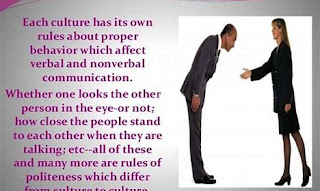1- WHAT IS CULTURE
Peter New Mark (1956) defines culture
as the way of life and its manifestations that are peculiar to a community
that uses a particular language as its means of expression.
2- WHAT IS TRANSLATION
Translation is a meanings making
process. A good translation provides a converted version of the source language
in the target language however, its focus remains on conveying the same
conception keeping in view, particularly, the cultural values of the latter.
3- LANGUAGE TYPES AS TRANSLATION BARRIERS
The recognition with the following
three forms of any language helps us understand how a language type, which
involves the role of culture, poses a hindrance in the way of proper and
suitable translation.
3.1 UNIVERSAL LANGUAGE
The words of any language which
represent man-made ubiquitous objects (mirror, pen or chair) are counted as the
tokens of universal language (UL). Nevertheless, the (UL) also includes such
words that speak of natural objects (moon, sky or plants) or phenomena (sleep,
float or die) which occur everywhere in the world. These words are easily
translated because there is no involvement of culture which tends to make
translation difficult.
3.2 CULTURAL LANGUAGE
Cultural language or dialect is
generally defined as a particular form of a language which is peculiar to a
specific region or social group. Hence, the people of one region may have
specific norms, customs and rituals which may be quite different from those of
other regions regarding the same event. There will be, definitely, a
translation problem because the connotations of such culture specific words may
need a vast explanation on the background of that cultural event.
3.3 PERSONAL LANGUAGE
Personal language or idiolect
represents the speech habits of a particular person. It means that every person
has a speech style of one’s own. A musician may compare his beloved’s hair with
strings of guitar and a geographer may say that they (hair) are like clouds.
Similarly, a motor mechanic rejoices when he says that her eyes shine like
headlight. However, a third person, who is more inclined to compare her legs
with compasses, may get confused with these comparisons. So, personal language
casts a barrier in the way to easy and flexible translation.
3.4 CULTURAL FOCUS AS BARRIER
Cultural focus originates when a
speech community focuses its attention on a particular topic and consequently
gives birth to a plethora of such words or terminologies which may be quite
unfamiliar to another speech community. Resultantly, this situation becomes a
strong barrier against translation process because such words, new to other
community, demand a vast explanation for comprehension. For instance, the
English on sport- notably the crazy cricket words (a maiden over, silly mid-on,
'howzzat'), similarly, the French on wines and cheeses, the Arabs on camels.

No comments